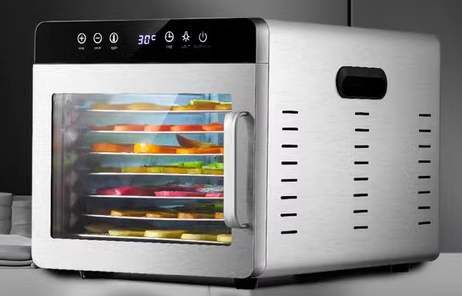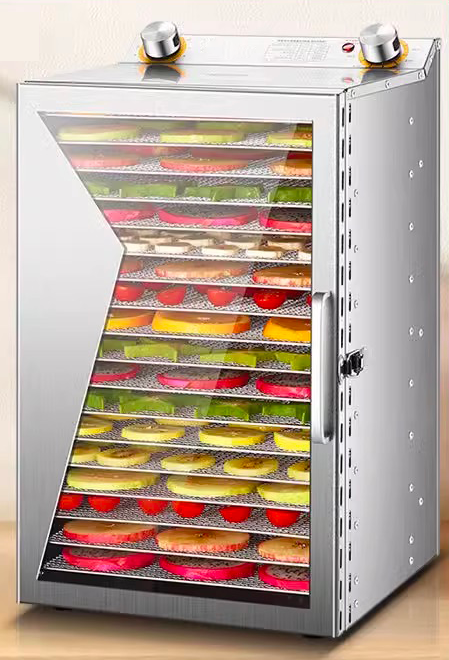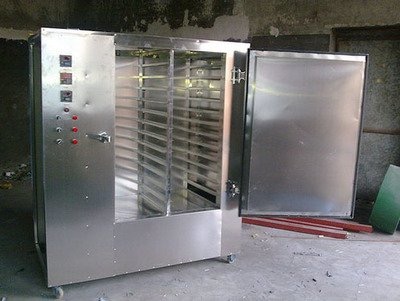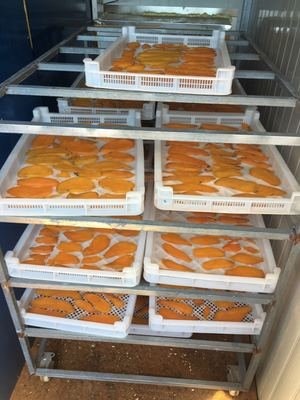
Content Menu
● Understanding Heat Pump Dryers
● Exploring Condenser Dryers
● Comparing Efficiency
● Applications in Food Drying
● Quality Considerations
● Environmental Impact
● Conclusion
● Frequently Asked Questions
>> 1. What types of foods can be dried using heat pump dryers?
>> 2. Are condenser dryers suitable for all types of food?
>> 3. How do I maintain my food dryer?
>> 4. What is the average lifespan of a food dryer?
>> 5. Can I use a home dryer for commercial purposes?
In the world of food preservation, drying is a crucial process that helps extend the shelf life of various products, from fruits and vegetables to meats and herbs. As a manufacturer of food drying machines, understanding the differences between heat pump dryers and condenser dryers can help businesses make informed decisions regarding their equipment choices. This article will explore the functionality, efficiency, and applications of these two types of dryers, with a focus on their relevance to food drying.

Understanding Heat Pump Dryers
Heat pump dryers utilize a refrigeration cycle to dry food items. They work by extracting moisture from the air inside the drying chamber and transferring it outside while simultaneously recycling heat back into the chamber. This process allows for lower drying temperatures, which is particularly beneficial for preserving the nutritional value and flavor of food.
- Energy Efficiency: Heat pump dryers are known for their energy efficiency. They can operate at lower temperatures compared to traditional dryers, which reduces energy consumption significantly.
- Temperature Control: These dryers allow for precise temperature control, making them suitable for delicate items that require specific drying conditions.
- Moisture Recovery: By condensing moisture from the air, heat pump dryers can recover water vapor, which can be reused in other processes or discharged outside.
- Versatility: They can handle a wide range of products, including fruits, vegetables, meats, and even pet foods.
The ability to maintain lower temperatures is particularly advantageous when drying sensitive foods such as berries or herbs. Higher temperatures can lead to nutrient degradation and loss of flavor compounds. Heat pump dryers also minimize the risk of over-drying or burning products, ensuring a more consistent quality in the final dried product.
Exploring Condenser Dryers
Condenser dryers operate on a different principle. They use a heating element to warm the air inside the drum. The warm air absorbs moisture from the food, which is then condensed into water and collected in a reservoir or drained away. This method is common in both household and commercial applications.
- Higher Operating Temperatures: Condenser dryers typically operate at higher temperatures than heat pump dryers. While this can speed up the drying process, it may also lead to nutrient loss in sensitive foods.
- Simple Operation: These dryers are generally easier to operate and maintain since they do not require complex refrigeration components.
- Initial Cost: The initial investment for condenser dryers is often lower than that of heat pump dryers. However, this can be offset by higher energy costs over time due to less efficient operation.
Condenser dryers are often favored in situations where speed is essential. For example, when processing large quantities of grains or nuts that are less prone to damage from high heat, condenser dryers can efficiently reduce moisture levels quickly.

Comparing Efficiency
When comparing heat pump dryers to condenser dryers in terms of efficiency:
| Feature | Heat Pump Dryer | Condenser Dryer |
| Energy Consumption | Low | Moderate to High |
| Drying Temperature | Low (suitable for sensitive foods) | High (may affect food quality) |
| Operational Cost | Lower over time | Higher due to energy usage |
| Maintenance | More complex | Simpler |
Heat pump technology allows for significant energy savings over time. While the initial cost may be higher, businesses can benefit from reduced utility bills as well as lower environmental impact due to decreased energy consumption. In contrast, condenser dryers may incur higher operational costs due to their inefficiency at converting energy into usable heat for drying.
Applications in Food Drying
Both types of dryers have unique applications in food processing:
- Heat Pump Dryers: Ideal for dehydrating fruits such as apples and bananas while retaining their color and flavor. They are also effective for drying herbs and vegetables without losing essential oils. Additionally, heat pump dryers are excellent for meat preservation through low-temperature drying methods that prevent spoilage.
- Condenser Dryers: Often used for bulk drying processes where speed is essential. They are suitable for items like grains or less sensitive products that can withstand higher temperatures. For example, when producing dried pasta or snacks like chips, condenser dryers can efficiently handle large batches without compromising production timelines.
Quality Considerations
Quality is paramount in food processing. The choice between heat pump and condenser dryers can significantly impact the final product's taste, texture, and nutritional value.
Heat pump dryers excel in preserving color and flavor due to their gentle drying process. For instance:
- Fruits dried using heat pump technology retain their vibrant colors compared to those dried with high-temperature methods.
- Herbs dried with heat pumps maintain their volatile oils better than those subjected to high heat in condenser systems.
Conversely, while condenser dryers may produce dried products faster, they often compromise on quality due to higher temperatures that can cause undesirable changes in flavor and appearance.
Environmental Impact
As sustainability becomes increasingly important in food production, energy-efficient technologies like heat pump dryers offer significant benefits:
- Reduced Carbon Footprint: By consuming less energy over time, heat pump dryers contribute less to greenhouse gas emissions compared to their condenser counterparts.
- Water Conservation: The moisture recovery feature in heat pump systems allows businesses to reuse water vapor within their processes or minimize water waste during operations.
In contrast, while condenser dryers may have lower upfront costs, their long-term environmental impact could be greater due to higher energy consumption rates.
Conclusion
Choosing between a heat pump dryer and a condenser dryer ultimately depends on the specific needs of your food processing operation. If energy efficiency and product quality are priorities, heat pump dryers may be the best choice. Conversely, if initial cost and simplicity are more critical factors, condenser dryers could be more suitable.
As a manufacturer providing OEM services for food drying machines, understanding these differences will help you guide your clients in selecting the right equipment for their needs. By prioritizing quality and efficiency in food processing equipment choices, businesses can enhance their product offerings while minimizing environmental impacts.

Frequently Asked Questions
1. What types of foods can be dried using heat pump dryers?
Heat pump dryers are suitable for a wide range of foods including fruits, vegetables, meats, and herbs due to their low-temperature operation.
2. Are condenser dryers suitable for all types of food?
While condenser dryers can dry many types of food effectively, they may not be ideal for delicate items that require low-temperature drying to preserve flavor and nutrients.
3. How do I maintain my food dryer?
Regular cleaning of filters and checking seals is essential for both types of dryers. For heat pump models, ensure that refrigerant levels are checked periodically by a professional technician.
4. What is the average lifespan of a food dryer?
With proper maintenance, both heat pump and condenser dryers can last 10 years or more; however, operational conditions may affect longevity.
5. Can I use a home dryer for commercial purposes?
Home models may not withstand the demands of commercial use; it's advisable to invest in industrial-grade equipment designed for higher volumes.












